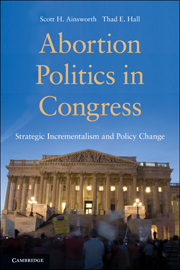Book contents
- Frontmatter
- Contents
- Tables
- Figures
- Acknowledgments
- Part I Strategic Incrementalism and the Political Backdrop for Abortion Politics in Congress
- 1 Some of the Politics Surrounding Abortion Policy
- 2 The Strategic Foundations for Incrementalism in Legislatures
- 3 The Nature of Congress and Incrementalism in Abortion Politics: Views from the Inside and Views from the Outside
- 4 A Short Legislative History of Abortion
- Part II Abortion in the House
- References
- Index
2 - The Strategic Foundations for Incrementalism in Legislatures
Published online by Cambridge University Press: 05 June 2012
- Frontmatter
- Contents
- Tables
- Figures
- Acknowledgments
- Part I Strategic Incrementalism and the Political Backdrop for Abortion Politics in Congress
- 1 Some of the Politics Surrounding Abortion Policy
- 2 The Strategic Foundations for Incrementalism in Legislatures
- 3 The Nature of Congress and Incrementalism in Abortion Politics: Views from the Inside and Views from the Outside
- 4 A Short Legislative History of Abortion
- Part II Abortion in the House
- References
- Index
Summary
Can the pro-choice movement survive victory? (Staggenborg 1996, 170)
The anti-abortion movement has, in many ways, become part of the establishment. (Toner 2004)
Introduction
Our claim that abortion politics in the U.S. House is dominated by incremental changes in policy is founded upon our understanding of legislative politics and the larger policy-making environment. Therefore, we first want to elaborate a strategic rationale for incrementalism in legislatures and to evaluate the nonincremental alternative as well. Members may have a variety of reasons for proposing changes to alter abortion policy. On the one hand, they may merely want to make a symbolic statement to their constituents that they oppose abortion; we discuss the symbolic nature of abortion politics in greater detail in Chapter 4. For now, let us say that with symbolic abortion politics, a member may simply introduce or cosponsor a bill – any type of bill – that reflects their position on abortion, either pro-choice or pro-life. If the goal of the member is to make a real change to abortion policies, he or she has to overcome firmly established opponents. Finding the path of least resistance to achieve this goal is crucial. We argue that incrementalism is a highly effective means of achieving success in the legislative arena, especially when the policy at hand is as volatile as abortion politics.
Since the publication of Charles Lindblom’s classic 1959 article, incrementalism, in one form or another, received nearly unparalleled attention in the social sciences for at least three decades. Lindblom’s work received tremendous prominence partly because it dovetailed nicely with the widely influential work of the 1978 Nobel Laureate Herbert Simon (1957a; 1957b). Incrementalism affected the course of public administration, public policy analysis, and especially budgeting (e.g., Davis, Dempster, and Wildavsky 1966; 1974; Gist 1977; 1982; Padgett 1980; Wildavsky 1964). The emphasis on repeated (or serial) searches for local (or incremental) gains was forever linked to Lindblom’s slightly pejorative notion of “muddling through.” The emphasis on small gains and the assumed limitations in cognitive abilities created a contrast to the rational choice school of thought, which emphasized a starker model of utility maximization in which all uncertainty could be handled through simple expected utility calculations. One might argue in retrospect that the differences between satisficing and constrained maximization were hardly drastic, but two distinct camps of scholars had been set. Theoretically, satisficers and maximizers had very different cognitive qualities, which led them to practice different policy-making processes and adopt different policies.
- Type
- Chapter
- Information
- Abortion Politics in CongressStrategic Incrementalism and Policy Change, pp. 27 - 55Publisher: Cambridge University PressPrint publication year: 2010



